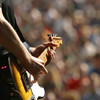#30707 by RyanStrain3032
Mon May 05, 2008 3:06 am
Mon May 05, 2008 3:06 am
Well, I decided to try and learn how to play guitar today. So I borrowed my Dad's guitar and he showed me some chords. I'm trying to learn the song, "Working Class Hero" by John Lenon, cause it's only 3 chords through the whole song and it's pretty easy...
MY FINGERS ARE KILLING ME! MY GOD!
*ahem*...
I have no problem memorizing the finger placement, but I'm having some trouble with going from one chord to the next. All I have to do is switch from "Am" to "G", then back to "Am". But I'm having a hard time switching quickly. Are there any exercises that could help me with this?
MY FINGERS ARE KILLING ME! MY GOD!
*ahem*...
I have no problem memorizing the finger placement, but I'm having some trouble with going from one chord to the next. All I have to do is switch from "Am" to "G", then back to "Am". But I'm having a hard time switching quickly. Are there any exercises that could help me with this?






